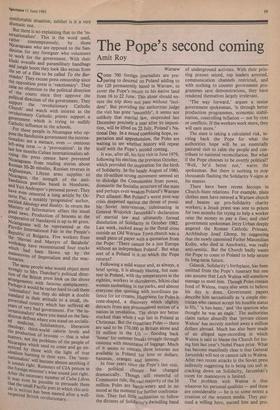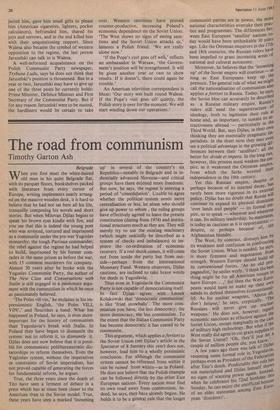The Pope's second coming
Amit Roy
Warsaw
Some 700 foreign journalists are pre- paring to descend on Poland adding to the 120 permanently based in Warsaw, to cover the Pope's return to his native land from 16 to 22 June. This alone should en- sure the trip does not pass without `inci- dent'. But providing the authorities judge the visit has gone 'smoothly', it seems not unlikely that martial law, suspended last December precisely a year after its imposi- tion, will be lifted on 22 July, Poland's Na- tional Day. In a mood combining hope, ex- pectation and apprehension, the Poles are waiting to see whether history will repeat itself with the Pope's second coming.
It was, after all, his first visit in June 1979, following his election the previous October, which provided the inspiration for the birth of Solidarity. In the heady August of 1980, the 10-million strong movement seemed set to dislodge the Communists from power, dismantle the Socialist structure of the state and perhaps even weaken Poland's Warsaw Pact alliance. But Poland's worst post-war crisis deepened against the threat of possi- ble Soviet intervention, culminating in General Wojceich Jaruzelski's declaration of martial law and ultimately formal dissolution of Solidarity in October 1982. Last week, tucked away in the floral cross outside an Old Warsaw Town church was a small piece of paper with a quotation from the Pope: 'There cannot be a just Europe without an independent Poland' But what sort of a Poland is it to which the Pope returns?
Following a mild winter and, as always, a brief spring, it is already blazing, hot sum- mer in Poland, with the temperatures in the eighties, workers in shirtsleeves, bikini-clad women sunbathing in the parks, and almost everyone else queuing with inordinate pa- tience for ice creams. Happiness for Poles is cone-shaped, a discovery which slightly detracts from any preconceived notion of a nation in revolution. The shops are better stocked than when I was last in Poland at Christmas. But the expatriate Poles — there are said to be 170,000 in Britain alone and 10 million in the US — flooding back `home' for summer breaks struggle through customs with mountains of luggage. Much of it seems to contain three luxuries not available in Poland for love or dollars: bananas, oranges and lemons. In four years since the Pope's last visit, the political climate dramatically. Though still resentful of Communist rule, the vast
majority of the 36 million Poles are battle weary
and in no mood at the moment for further confronta- tion. They feel little inclination to follow the dictates of Solidarity's dwindling band
has changed of underground activists. With their prin- ting presses seized, top leaders arrested, communication channels restricted, and with nothing to counter government pro- grammes save demonstrations, they have rendered themselves largely irrelevant.
`The way forward,' argues a senior government spokesman, 'is through better production programmes, economic stabil- isation, controlling inflation — not by riots or conflicts. If the workers work more, they will earn more.'
The state is taking a calculated risk, in- viting back the Pope for what the authorities hope will be an essentially pastoral visit to calm the people and con- tribute to national reconciliation. But what if the Pope chooses to be overtly political? `Well, he'd better not,' warns the spokesman. But there is nothing to stop thousands flashing the Solidarity V-signs at his masses.
There have been recent hiccups in Church-State relations. For example, plain clothes men have entered a Warsaw church and beaten up pro-Solidarity charity workers; a Jesuit priest was sent to prison for two months for trying to help a worker raise the money to pay a fine; and chief government spokesman Jerzy Urban deeply angered the Roman Catholic Primate, Archbishop Josef Glemp, by suggesting that the newly canonised Father Maximilian Kolbe, who died at Auschwitz, was really anti-semitic. But the Church badly wants the Pope to come to Poland to help secure its long-term future.
Gdansk, Solidarity's birthplace, has been omitted from the Pope's itinerary but one can assume that Lech Walesa will somehow manage to meet him. Though Poles remain fond of Walesa, many also seem to believe his day is done. Government papers describe him sarcastically as `a simple elec- trician who cannot accept his humble status in life,' a has-been,' and 'the sparrow who thought he was an eagle.' The authorities claim rather absurdly that `private citizen Walesa' has secretly stashed away a million dollars abroad. Much has also been made of an alleged tape-recording in which Walesa is said to blame the Church for los- ing him last year's Nobel Peace prize. What has become manifestly clear is that General Jaruzelski will not or cannot talk to Walesa. After two recent attacks in the Soviet press indirectly suggesting he is being too soft in cracking down on Solidarity, Jaruzelski's room for manoeuvre is limited.
The problem with Walesa is that whatever his personal qualities — and these are considerable — he is to some extent a creation of the western media. They pur- sued a willing hero, nursed him and pro- jetted him, gave him small gifts to please him (American cigarettes, lighters, pocket calculators), befriended him, shared his joys and sorrows, and in the end killed him with their unquestioning support. Since Walesa also became the symbol of western opposition to the regime, the last person Jaruzelski can talk to is Walesa.
A well-informed acquaintance on the Polish Communist Party newspaper, Trybuna Ludu, says he does not think that Jaruzeiski's position is threatened. But in a year or two, Jaruzelski may have to give up one of the three posts he currently holds: Prime Minister, Defence Minister and First Secretary of the Communist Party. But if for any reason Jaruzelski were to be ousted, the hardliners would be certain to take over. Western sanctions have proved counter-productive, increasing Poland's economic dependence on the Soviet Union. 'The West shows no signs of easing sanc- tions and the Soviet Union attacks us,' laments a Polish friend. 'We are really alone now.'
`If the Pope's visit goes off wells' reflects an ambassador in Warsaw, 'the Govern- ment's position will be strengthened. It will be given another year or two to show results. If it doesn't, there could again be trouble.'
An American television correspondent is blunt: 'Our story was built round Walesa. If the Pope's visit goes off quietly, the Polish story is over for the moment. We will start winding down our operations.'











































 Previous page
Previous page